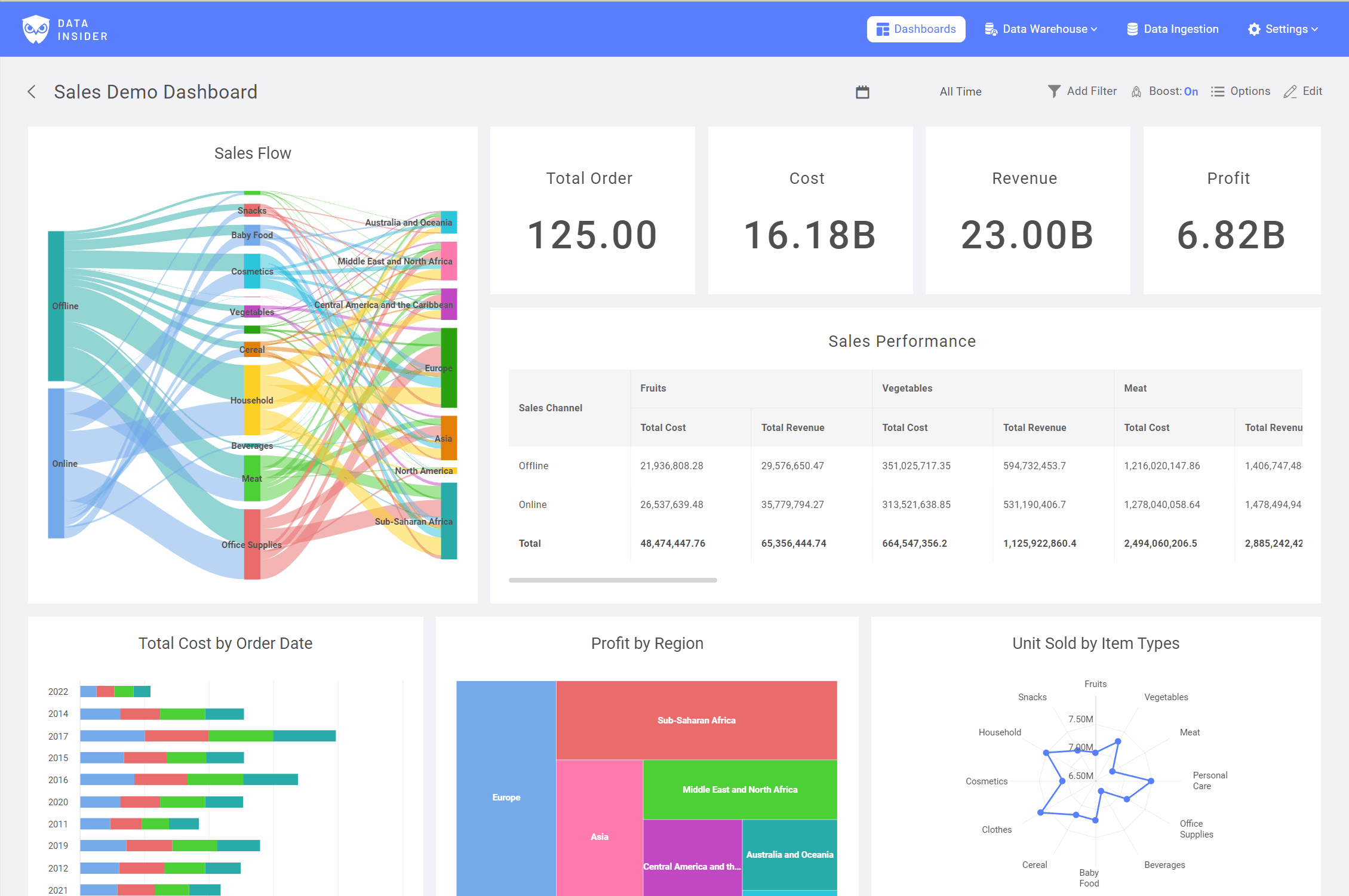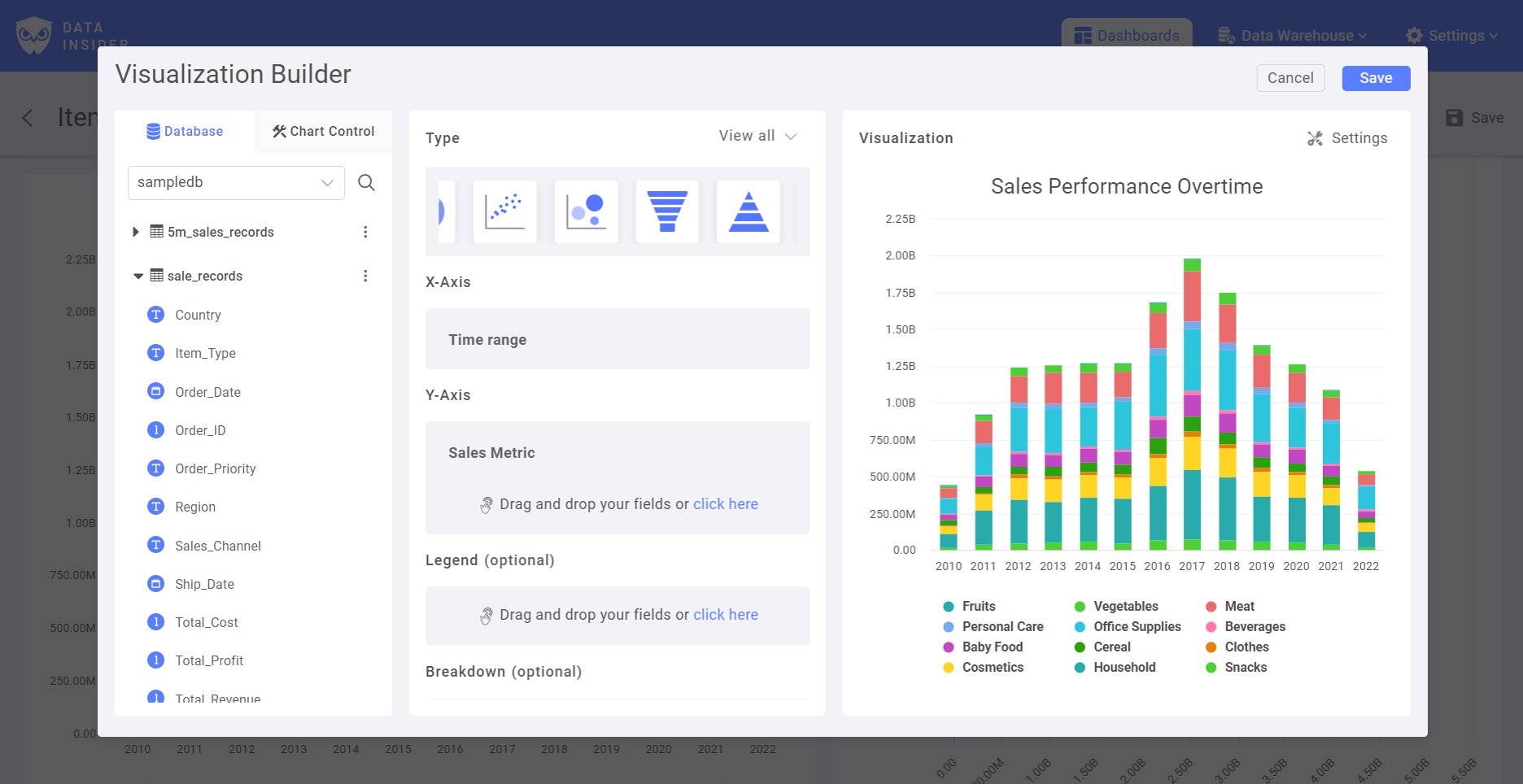RocketBI is a self-service, web-based business intelligent product tailor-made for analytical databases. RocketBI is the core product of DataInsider stack. You can use RocketBI to analyze, visualize, and easily collaborate with your friends.
To learn more about DataInsider's stack and RocketBI's features, see our documentation.
You could try the demo version at https://demo.rocket.bi
To try out RocketBI on your machine, the best way is using our pre-built Docker images.
Prerequisites:
- docker engine 19.0+
- docker-compose 2.0+
1.1. Download docker-compose file:
mkdir rocket-bi && cd rocket-bi
wget https://raw.githubusercontent.com/datainsider-co/rocket-bi/main/docker/docker-compose.yml1.2. (Optional) Install sample clickhouse:
If you don't have clickhouse access at the moment, you can still try RocketBI by installing our sample clickhouse instance by running the following commands:
wget https://raw.githubusercontent.com/datainsider-co/rocket-bi/main/docker/sample_clickhouse_cluster.zip
unzip sample_clickhouse_cluster.zip
cd sample_clickhouse_cluster/
docker-compose up -d
./import_sample_data.sh
cd -NOTE: If you're installing RocketBI on the same host with your clickhouse-server, please use 172.17.0.1 as your
CLICKHOUSE_HOST instead of localhost for docker to resolve hosts correctly.
docker-compose up -d- Open browser and go to localhost:5050 to enter the web UI.
- Login to RocketBI with this default account:
username: [email protected]
password: 123456- Setup your data connection. RocketBI support multiple connectors such as Clickhouse, BigQuery, Vertica, MySql...
- Begin by creating a dashboard and using drag-n-drop tool to explore your data.
Prerequisites:
- java 8
- maven 3
- mysql 5.7
- ssdb 1.9.9
git clone https://github.com/datainsider-co/rocket-bi.git
cd rocket-bi-server
# install needed libraries:
./libs/install.sh
# build source:
mvn package
# config mysql and ssdb host/port (default port for mysql is localhost:3306 and for ssdb is localhost:8888):
vi conf/local.conf
# start service locally:
./runservice start localServices will be start at specific port specify in conf/local.conf file. For example, the default http port for
bi-service is 8080, to test if bi-service is up and running, run:
curl localhost:8080/pingTo stop a service, run:
./runservice stopPrerequisites:
- node v12.22.9
- yarn 1.22.19
Start building web client by running:
cd rocket-bi-web
yarn serveWeb will be served at port 8080.
For the complete documentation visit datainsider.co.
For contribution guidelines, see contributing.
- To report a bug or request a feature, create an Issue. Please make it easy for people to reproduce your issue.
Adhoc-Query: Using SQL to do complex analysis & visualise the result with just drag-n-drop for a clear perspective. There are also supported functions & autocompletion for SQL query.
Drag-n-Drop Chart Builder: Users can efficiently perform drag-and-drop actions to create charts and fully customisable informative reports with a wide range of easy-to-use and flexible settings options.
Interactive Dashboard: Help users visualise data, simply click to dig deeper into the underlying data and filter operational information so that data can be viewed from different perspectives or in more detail.
Apply filter to Dashboard: Using a dashboard filter, users can quickly apply different data viewpoints to a single dashboard rather than creating additional dashboards.
Add Control to Chart: Help users dynamically change the metrics to view multiple fields applied to that property with a simple click instead of creating multiple charts.
Drilldown your data: By clicking on a metric in a chart, users can quickly take a deep dive into a dataset to explore detailed information from various perspectives.
No Code ETL data: With our branded no-code data modeling, business users can load, transform & extract data without writing a single line of code.
Row-Level Security: Limit a user's access to certain data, define filters for each Attribute Value, and restrict data access to query and view at the row level.
Share & Collaboration: Share with the rest of your organisation by granting access or providing links to them.
Calculated & Measurement Fields: Create a dynamic data view by using existing database fields and applying additional logic.
Create Relationship: Click and connect relationships from multiple tables, and do cross sources analysis.
Schema Management with Data Encryption: Collect, store, and utilise data in a cost-effective, efficient, and secure manner

















